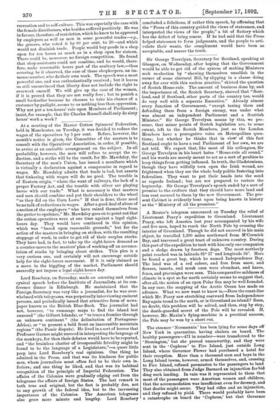Sir George Trevelyan, Secretary for Scotland, speaking at Glasgow, on
Wednesday, after hoping that the Government would be able to get rid of the system of making Ministers seek re-election by "showing themselves unselfish in the corner of some electoral Bill, by slipping in a clause doing away for ever with this useless practice," skirted the question of Scotch Home-rule. The amount of business done by, and the importance of, the Scotch Secretary, showed that "Scot- and if Scotland, other parts of the country too, would do very well with a separate Executive." Already almost every function of Government, "except taxing them and defending them from a foreign enemy, was under what was almost an independent Parliament and a Scottish Minister." Sir George Trevelyan means by this, we pre- sume, that minor points of Scotch legislation are, to some extent, left to the Scotch Members, just as the London Members have a prerogative voice on Metropolitan ques- tions ; but whether he thinks that in vie'* of this fact Scotland ought to have a real Parliament of her own, we are not told. We expect that, like most of his colleagues, Sir George Trevelyan in his heart hates "Home-rule all round," and his words are merely meant to act as a sort of poultice to keep things from getting inflamed. In truth, the Gladatonians, though they have wilfully torn open the Irish wound, are
frightened when they see the whole body politic festering into federalism. They want to put their heads into the sand as regards Ireland ; but are not prepared to restore the heptarchy. Sir George Trevelyan's speech ended by a sort of promise to the crofters that they should have more land and less rent secured to them by the new Government. The pre- sent Cabinet is evidently bent upon being known in history as the "Ministry of all the promises."


































 Previous page
Previous page